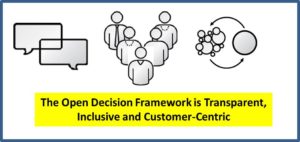
Allison McMurray, Senior Director, Global Talent Center of Excellence at Red Hat presented the Open Decision Framework of Decision Making and Project Management at our February 2017 TSRM meeting
On February 16, 2017, I attended such a session at that month’s TSHRM meeting, titled “Open Sesame! The Power of Open-Source Decisions.” Allison McMurray, Senior Director, Global Talent Center of Excellence at Red Hat presented the Open Decision Framework of Decision Making and Project Management.
A few years ago, I heard Red Hat CEO and President Jim Whitehurst speaking at a session on Corporate Social Responsibility, and he offered Red Hat’s commitment to “open sourcing” as a prime example that aligns with community efforts to provide free access to important information and applications. Link to my blog about that session. Allison McMurray at the TSHRM session followed up with the Open Decision Framework as a proven process within Red Hat that is now documented and available for anyone to use. Link to Open Decision Framework on GitHub.

The Key Elements of Open Decision Framework include:
• Open Exchange. This includes leading with transparency, publishing work as it proceeds, setting expectations up front, and managing those expectations along the way.
• Participation. It is crucial to engage customers and stakeholders early and often. Effective participation includes making it safe to voice concerns, and being specific about what feedback you are looking for.
• Releasing Early and Often. This means as the project progresses, publishing progress openly. That includes showing how feedback was used in shaping the project direction, and being open about ongoing expectations around requirements and constraints.
• Meritocracy. The best idea wins no matter where and who it came from. This truly encourages everyone to contribute.
• Community. That a team can truly accomplish more together
I believe it is very easy to see that using this framework for managing any project would increase its probability of success.
The Open Decision Framework strongly supports one of the emerging sub-fields of diversity and inclusion, Diversity of Thought. Companies are now looking beyond diversity of appearance and to diversity in ways of thinking. When companies open themselves to diverse approaches to business problems and developing solutions, often a blended solution which includes different ideas results in a much stronger answer. When an enterprise is comprised of leaders who all think exactly alike, there is a huge potential for missing entire market segments and innovative products and offerings. Embracing diversity of thought includes listening to others and keeping an open mind to creativity and innovation.
This “Open Decision Framework” is an excellent execution of Diversity of Thought, and I encourage all my blog readers to get more information about it and look at building a cultural shift to project management at your enterprise.


